Thesaurus : Doctrine
Référence complète : Queinnec, Y et Constantin, A., Devoir de vigilance. Les organes de gouvernance des entreprises en première ligne, in Le Big Bang des devoirs de vigilance ESG : les nouveaux enjeux de RSE et de droit de l'homme, doss., Revue Lamy Droit des Affaires, n°104, mai 2015, p.68-74.
____
Thesaurus : Soft Law
Référence complète : Response to the Study on Directors’ Duties and Sustainable Corporate Governance by Nordic Company Law Scholars, octobre 2020.
May 29, 2026
Publications

🌐Follow Marie-Anne Frison-Roche on LinkedIn
🌐Subscribe to the Newsletter MAFR Regulation, Compliance, Law
🌐Subscribe to the video newsletter MAFR Overhang
🌐Subscribe to the Newsletter MaFR Law & Art
____
► Full Reference: M.-A. Frison-Roche, "In Compliance Law, the legal consequences for Entreprises of their commitments and undertakingsn", in M.-A. Frison-Roche (ed.), Compliance Obligation, Journal of Regulation & Compliance (JoRC) and Bruylant, "Compliance & Regulation" Serie, 2026, forthcoming.
____
📝read the article
____
____
📘read a general presentation of the book, Compliance Obligation, in which this article is published
____
► Summary of this article: The innocents might believe, taking the Law and its words literally, that "commitments" are binding on those who make them. Shouldn't they be afraid of falling into the trap of the 'false friend', which is what the Law wants to protect them from (as stated in the prolegomena)?
Indeed, the innocent persons think that those who make commitments ask what they must do and say what they will do. Yet, strangely enough, the 'commitments' that are so frequent and common in compliance behaviours are often considered by those who adopt them to have no binding value! Doubtless because they come under disciplines other than Law, such as the art of Management or Ethics. It is both very important and sometimes difficult to distinguish between these different Orders - Management, Moral Norms and Law - because they are intertwined, but because their respective standards do not have the same scope, it is important to untangle this tangle. This potentially creates a great deal of insecurity for companies (I).
The legal certainty comes back when commitments take the form of contracts (II), which is becoming more common as companies contractualise their legal Compliance Obligations, thereby changing the nature of the resulting liability, with the contract retaining the imprint of the legal order or not having the same scope if this prerequisite is not present.
But the contours and distinctions are not so uncontested. In fact, the qualification of unilateral undertaking of will is proposed to apprehend the various documents issued by the companies, with the consequences which are attached to that, in particular the transformation of the company into a 'debtor', which would change the position of the stakeholders with regard to it (III).
It remains that the undertakings expressed by companies on so many important subjects cannot be ignored: they are facts (IV). It is as such that they must be legally considered. In this case, Civil Liability will have to deal with them if the company, in implementing what it says, what it writes and in the way it behaves, commits a fault or negligence that causes damage, not only the sole existence of an undertaking.
________
________
May 29, 2026
Editorial responsibilities : Direction of the collection Compliance & Regulation, JoRC and Bruylant

🌐Follow Marie-Anne Frison-Roche on LinkedIn
🌐Subscribe to the Newsletter MAFR Regulation, Compliance, Law
🌐Subscribe to the video newsletter MAFR Overhang
🌐Subscribe to the Newsletter MaFR Law & Art
____
► Full Reference: M.-A. Frison-Roche (ed.), Compliance Obligation, Journal of Regulation & Compliance (JoRC) and Bruylant, "Compliance & Regulation" Serie, 2026, to be published
____
📕In parallel, a book in French L'Obligation de compliance, is published in the collection "Régulations & Compliance" co-published by the Journal of Regulation & Compliance (JoRC) and Lefebvre-Dalloz.
____
📚This book is inserted in this series created by Marie-Anne Frison-Roche for developing Compliance Law.
read the presentations of the other books of this Compliance Series:
- further books:
🕴️M.A. Frison-Roche (ed.), 📘Compliance Evidential System, 2027
🕴️M.A. Frison-Roche (ed.), 📘Compliance and Contract, 2027
- previous books:
🕴️M.A. Frison-Roche (ed), 📘Compliance Juridictionnalisation, 2023
🕴️M.A. Frison-Roche (ed), 📘Compliance Monumental Goals, 2022
🕴️M.-A. Frison-Roche (ed.), 📘Compliance Tools, 2021
____
► go to the general presentation of this 📚Series Compliance & Regulation, conceived, founded et managed by Marie-Anne Frison-Roche, co-published par the Journal of Regulation & Compliance (JoRC) and Bruylant.
____
🧮the book follows the cycle of colloquia organised by the Journal of Regulation & Compliance (JoRC) and its Universities partners.
____
► general presentation of the book: Compliance is sometimes presented as something that cannot be avoided, which is tantamount to seeing it as the legal obligation par excellence, Criminal Law being its most appropriate mode of expression. However, this is not so evident. Moreover, it is becoming difficult to find a unity to the set of compliance tools, encompassing what refers to a moral representation of the world, or even to the cultures specific to each company, Compliance Law only having to produce incentives or translate this ethical movement. The obligation of compliance is therefore difficult to define.
This difficulty to define affecting the obligation of compliance reflects the uncertainty that still affects Compliance Law in which this obligation develops. Indeed, if we were to limit this branch of law to the obligation to "be conform" with the applicable regulations, the obligation would then be located more in these "regulations", the classical branches of Law which are Contract Law and Tort Law organising "Obligations" paradoxically remaining distant from it. In practice, however, it is on the one hand Liability actions that give life to legal requirements, while companies make themselves responsible through commitments, often unilateral, while contracts multiply, the articulation between legal requirements and corporate and contractual organisations ultimately creating a new way of "governing" not only companies but also what is external to them, so that the Monumental Goals, that Compliance Law substantially aims at, are achieved.
The various Compliance Tools illustrate this spectrum of the Compliance Obligation which varies in its intensity and takes many forms, either as an extension of the classic legal instruments, as in the field of information, or in a more novel way through specific instruments, such as whistleblowing or vigilance. The contract, in that it is by nature an Ex-Ante instrument and not very constrained by borders, can then appear as a natural instrument in the compliance system, as is the Judge who is the guarantor of the proper execution of Contract and Tort laws. The relationship between companies, stakeholders and political authorities is thus renewed.
____
🏗️general construction of the book
The book opens with a substantial Introduction, putting the different sort of obligations of compliance in legal categories for showing that companies must build structures of compliance (obligation of result) and act to contribute with states and stakeholders to reach Monumental Goals (obligation of means).
The first part is devoted to the definition of the Compliance Obligation.
The second part presents the articulation of Compliance obligation with the other branchs of Law, because the specific obligation is built by Compliance Law, as new substantial branch of Law but also by many other branchs of Law.
The third part develops the pratical means established to obtained the Compliance Obligation to be effective, efficace and efficient.
The fourth part takes the Obligation of Vigilance as an illustration of all these considerations and the discussion about the future of this sparehead fo the Compliance Obligation .
The fifth part refers to the place and the role of the judges, natural characters for any obligation.
____
TABLE OF CONTENTS
ANCHORING THE SO DIVERSE COMPLIANCE OBLIGATIONS IN THEIR NATURE, REGIMES AND FORCE TO BRING OUT THE VERY UNITY OF THE COMPLIANCE OBLIGATION, MAKING IT COMPREHENSIBLE AND PRACTICABLE
🔹 Compliance Obligation: building a compliance structure that produces credible results withe regard to the Monumentals Goals targeted by the Legislator, by 🕴️Marie-Anne Frison-Roche
TITLE I.
IDENTIFYING THE COMPLIANCE OBLIGATION
CHAPTER I: NATURE OF THE COMPLIANCE OBLIGATION
Section 1 🔹 Will, Heart and Calculation, the three marks surrounding the Compliance Obligation, by 🕴️Marie-Anne Frison-Roche
Section 2 🔹 Debt, as the basis of the compliance obligation, by 🕴️Bruno Deffains
Section 3 🔹 Compliance Obligation and Human Rights, by 🕴️Jean-Baptiste Racine
Section 4 🔹 Compliance Obligation and changes in Sovereignty and Citizenship, by 🕴️René Sève
Section 5 🔹 The definition of the Compliance Obligation in Cybersecurity, by 🕴️Michel Séjean
CHAPTER II: SPACES OF THE COMPLIANCE OBLIGATION
Section 1 🔹 Industrial Entities and Compliance Obligation, by 🕴️Etienne Maclouf
Section 2 🔹 Compliance, Value Chains and Service Economy, by 🕴️Lucien Rapp
Section 3 🔹 Compliance and conflict of laws. International Law of Vigilance-Conformity, based on applications in Europe, by 🕴️Louis d'Avout
TITLE II.
ARTICULATING THE COMPLIANCE OBLIGATION WITH OTHER BRANCHES OF LAW
Section 1 🔹 Tax Law and Compliance Obligation, by 🕴️Daniel Gutmann
Section 2 🔹 General Procedural Law, prototype of the Compliance Obligation, by 🕴️Marie-Anne Frison-Roche
Section 3 🔹 Corporate and Financial Markets Law facing the Compliance Obligation, by 🕴️Anne-Valérie Le Fur
Section 4 🔹 Transformation of Governance and Vigilance Obligation, by 🕴️Véronique Magnier
Section 5 🔹 The Relation between Tort Law and Compliance Obligation, by 🕴️Jean-Sébastien Borghetti
Section 6 🔹 Environmental and Climate Compliance, by 🕴️Marta Torre-Schaub
Section 7 🔹 Competition Law and Compliance Law, by 🕴️Jean-Christophe Roda
Section 8 🔹 The Compliance Obligation in Global Law, by 🕴️Benoît Frydman & 🕴️Alice Briegleb
Section 9 🔹 Environmental an Climatic Dimensions of the Compliance Obligation, by 🕴️Marta Torre-Schaub
Section 10 🔹 Judge of Insolvency Law and Compliance Obligations, by 🕴️Jean-Baptiste Barbièri
TITLE III.
COMPLIANCE: GIVE AND TAKE THE MEANS TO OBLIGE
CHAPTER I: COMPLIANCE OBLIGATION: THE CONVERGENCE OF SOURCES
Section 1 🔹 Compliance Obligation upon Obligation works, by 🕴️Marie-Anne Frison-Roche
Section 2 🔹 Conformity technologies to meet Compliance Law requirements. Some examples in Digital Law, by 🕴️Emmanuel Netter
Section 3 🔹 Legal Constraint and Company Strategies in Compliance matters, by 🕴️Jean-Philippe Denis & 🕴️Nathalie Fabbe-Coste
Section 4 🔹 Opposition and convergence of American and European legal systems in Compliance Rules and Systems, by 🕴️Raphaël Gauvain & 🕴️Blanche Balian
Section 5 🔹 In Compliance Law, the legal consequences for Entreprises of their Commitments and Undertakings, by 🕴️Marie-Anne Frison-Roche
CHAPTER II: INTERNATIONAL ARBITRATION IN SUPPORT OF THE COMPLIANCE OBLIGATION
Section 1 🔹 How International Arbitration can reinforce the Compliance Obligation, by 🕴️Laurent Aynès
Section 2 🔹 Arbitration consideration of Compliance Obligation for a Sustainable Arbitration Place, by 🕴️Marie-Anne Frison-Roche
Section 3 🔹 The Arbitral Tribunal's Award in Kind, in support of the Compliance Obligation, by 🕴️Eduardo Silva Romero
Section 4 🔹 The use of International Arbitration to reinforce the Compliance Obligation: the example of the construction sector, by 🕴️Christophe Lapp
Section 5 🔹 The Arbitrator, Judge, Supervisor, Support, by 🕴️Jean-Baptiste Racine
TITLE IV.
VIGILANCE, SPEARHEAD OF THE COMPLIANCE OBLIGATION
Section 1 🔹 Vigilance Obligation, Spearheard and Total Share of the Compliance Obligation, by 🕴️Marie-Anne Frison-Roche
CHAPTER I: INTENSITIES OF THE VIGILANCE OBLIGATION, SPEARHEAD OF THE COMPLIANCE SYSTEM
Section 2 🔹 Intensity of the Vigilance Obligation by Sectors: the case of Financial Operators, by 🕴️Anne-Claire Rouaud
Section 3 🔹 Intensity of the Vigilance Obligation by Sectors: the case of Digital Operators, by 🕴️Grégoire Loiseau
Section 4 🔹 Intensity of the Vigilance Obligation by Sectors: the case of Energy Operators, by 🕴️Marie Lamoureux
CHAPTER II: GENERAL EVOLUTION OF THE VIGILANCE OBLIGATION
Section 1 🔹 Rethinking the Concept of Civil Liability in the light of the Duty of Vigilance, Spearhead of Compliance, by 🕴️Mustapha Mekki
Section 2 🔹 Contracts and clauses, implementation and modalities of the Vigilance Obligation, by 🕴️Gilles J. Martin
Section 3 🔹 Proof that Vigilance has been properly carried out with regard to the Compliance Evidence System, by 🕴️Jean-Christophe Roda
Section 4 🔹 Compliance, Vigilance and Civil Liability: put in order and keep the Reason, by 🕴️Marie-Anne Frison-Roche
Title V.
THE JUDGE AND THE COMPLIANCE OBLIGATION
Section 1 🔹 Present and Future Challenges of Articulating Principles of Civil and Commercial Procedure with the Logic of Compliance, by 🕴️Thibault Goujon-Bethan
Section 2 🔹 The Judge required for an Effective Compliance Obligation, by 🕴️Marie-Anne Frison-Roche
________
CONCLUSION
THE COMPLIANCE OBLIGATION: A BURDEN BORNE BY SYSTEMIC COMPANIES GIVING LIFE TO COMPLIANCE LAW
(conclusion and key points of the books, free access)
Sept. 4, 2025
Thesaurus : Doctrine

► Full Reference: V. Magnier, "Transformation de la gouvernance et obligation de vigilance" (The transformation of governance and due diligence), in M.-A. Frison-Roche (dir.), L'Obligation de Compliance, Journal of Regulation & Compliance (JoRC) and Dalloz, coll. "Régulations & Compliance", 2024, forthcoming
____
📕read the general presentation of the book, L'Obligation de Compliance, in which this contribution is published
____
► English summary of this contribution (done by the Journal of Regulation & Compliance - JoRC) : The author develops the tensions caused by Compliance Law and the Duty of Vigilance on corporate governance.
The French "Sapin 2" law targets corruption, while the French "Vigilance" law has a broader scope in terms of risks and the entire value chain. It is logical that this should create tensions in terms of governance, given the monumental goals involved. Companies need to take ownership of the powers delegated to them, which means rethinking their governance and the way in which they exercise their corporate mandates, with the corporate interest, the judge's compass, having to be combined with the adoption of new standards of behaviour formalised voluntarily by ethical charters in line with international standards. On this voluntary and supervised basis, the company must adapt its structure and then contractualise these norms.
This ethical approach has an impact on the role of corporate organs, not only in terms of transparency and risk prioritisation, but also proactively in terms of the adoption of commitments whose sincerity will be verified, as reflected, for example, in corporate governance codes (cf.in France the AFEP-MEDEF Code), the setting up of ad hoc committees and the presence of stakeholders, who will be consulted when the vigilance plan is drawn up.
She stresses that this creates tensions, that dialogue is difficult, that business secrecy must be preserved, but that stakeholders must become Vigilance watchdogs, a role that should not be left to the public authorities alone.
____
🦉this article is available in full text pour the persons following the Professor Marie-Anne Frison-Roche teaching
________
Sept. 4, 2025
Thesaurus : Doctrine

► Référence complète : A.-V. Le Fur, "Le droit des sociétés et des marchés financiers face à l'Obligation de Compliance", in M.-A. Frison-Roche (dir.), L'Obligation de Compliance, Journal of Regulation & Compliance (JoRC) et Dalloz, coll. "Régulations & Compliance", 2025, sous presse.
____
📕lire une présentation générale de l'ouvrage, L'Obligation de Compliance, dans lequel cet article est publié
____
► Résumé de l'article (fait par le Journal of Regulation & Compliance - JoRC) : L'auteure montre que le Droit des sociétés et des marchés financiers est en train d'être transformé en profondeur par le Droit de la Compliance. Par une succession de textes un mouvement de fond a transformé ces deux branches du Droit, par ailleurs corrélées.
L'auteure situe la première perception de ce mouvement interne au Droit des sociétés dans la loi NRE, pour décrire ensuite les lois sur l'information des associés, des investisseurs et des parties prenantes. Elle a insiste sur la loi dite "Pacte", qui changea la conception même de ce qu'est une société au regard de ce qu'est une entreprise. Cela est indissociable des lois et des jurisprudences que l'on associe davantage au Droit de la Compliance, notamment la loi dite "Sapin 2" et la loi dite "Vigilance", les textes de directives poursuivant cette transformation si profonde.
________
🦉Cet article est accessible en texte intégral pour les personnes inscrites aux enseignements de la Professeure Marie-Anne Frison-Roche
________

June 25, 2025
Teachings : Participation à des jurys de thèses

🌐follow Marie-Anne Frison-Roche on LinkedIn
🌐subscribe to the Newsletter MAFR Regulation, Compliance, Law
🌐subscribe to the Video Newsletter MAFR Surplomb
🌐subscribe to the Newsletter MaFR Droit & Art
____
► Full Reference: M.-A. Frison-Roche, member of the jury for Annika Bauch's thesis, Le droit de l'entreprise à l'épreuve de la compliance (Company Law put to the test of Compliance), University of Toulouse, 5 June 2025, 2-5pm.
____
🪑🪑🪑Other members of the jury :
🕴🏻Lukas Rass-Masson, Professor at Toulouse-Capitole University, thesis supervisor
🕴🏻Sandrine Tisseyre, Professor at Toulouse-Capitole University,
🕴🏻Marc-Philippe Weller, Professor at the University of Heidelberg, Germany
🕴🏻Caroline Coupet, Professor at the Université Panthéon-Assas (Paris II)
____
► Presentation of the thesis: The thesis is based on French, American and German research. It is based on two perspectives.
The first part of the thesis describes the way in which Business Law feeds into Compliance, since it is within Business Law (and more particularly Company Law and the legal rules governing corporate bodies) that Compliance, which the author presented to have originated in the United States, has transformed the way in which companies must be managed, having to take into account the extra-financial dimension of their activity, which modifies the very notion of social interest and leads to the integration of stakeholders into the corporate functioning.
The second part of the thesis looks at the way in which Compliance has transformed Corporate Law, bringing with it new requirements, such as consideration of risks, regulatory mechanisms and ethical concerns, with the company itself becoming a vehicle for Compliance. This is achieved in particular by inserting compliance clauses into contracts, which is an appropriate but nevertheless limited tool for this compliance goal.
____
At the end of her defence, the candidate was awarded the degree of Doctor of Law and was informally congratulated by her jury on the quality of her work.
____
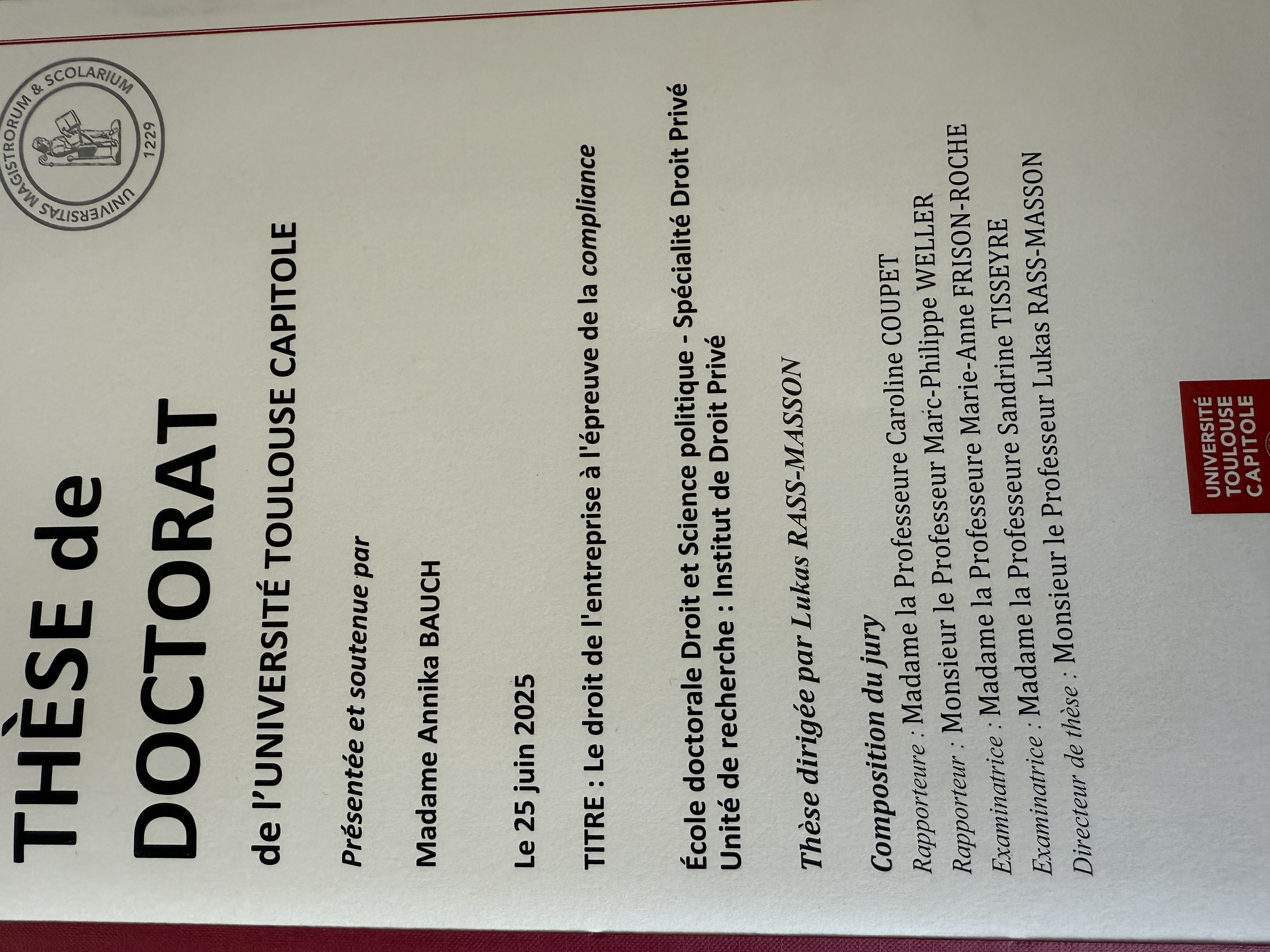
June 25, 2025
Thesaurus : Doctrine
► Référence complète : A. Bauch, Le droit de l’entreprise à l’épreuve de la compliance, Thèse Université Toulouse Capitole 2025, 492 pages dactyl.
____
soutenue le 25 juin 2025.
🪑🪑🪑Membres du jury :
🕴🏻Lukas Rass-Masson, professeure à l'Université Toulouse-Capitole, directeur de la thèse
🕴🏻Sandrine Tisseyre, professeure à l'Université Toulouse- Capitole, rapporteure
🕴🏻Philippe Weller, professeure à l'Université d'Heidelberg, rapporteur
🕴🏻Caroline Coupet, professeure à l'Université Panthéon-Assas (Paris II)
🕴🏻Marie-Anne Frison-Roche
____
► Présentation de la thèse
Feb. 12, 2025
Thesaurus : 02. Cour de cassation

► Référence complète : Com., 12 février 2025, n°23-20.079, M c/ société MDC
____
____
Description de l'arrêt.
Les statuts d'une SAS comprennent une clause d'exclusion d'associé, stipulation qui prévoit une notification préalable au moins 30 jours avant, donnant les motifs et la date de la réunion pour que l'associé puisse faire valoir ses arguments en défense.
En juin 2018, l'associé est convoqué, les motifs communiqués étant le fait qu'il travaillerait en même pour une entreprise concurrence, à une réunion préalable à laquelle il se ne rend pas.
A l'AG de la semaine suivante, l'associé est exclu.
Il attaque en nullité la délibération
Puis en 2019, la société est mise en redressement judiciaire puis liquidée, le litige se poursuivant donc entre l'associé et le liquidateur.
La Cour d' appel de Rouen donne satisfaction à l'associé en estimant que la notification adressée ne mentionnait que le fait de travailler depuis plusieurs années pour une entreprise concurrente ce qui est contraire aux obligations de l'associé, sans préciser ni l'identité de l'entreprise ni l'activité en question ne satisfaisait pas à la stipulation statutaire d'exclusion.
La Chambre commerciale prononce une cassation sur le fondement de l'article 1134 du Code civil selon lequel les conventions tiennent lieu de loi à ceux qui les ont faites. Elle relève en effet que la clause statutaire exige la notification des motifs mais pas de telles précisions.
____
Nov. 7, 2024
Thesaurus : Doctrine
► Référence complète : Th. Favario, "Le contenu du "rapport de durabilité"", JCP E, 7 nov. 2024, n° 45, doss. 1319, pp. 28-33
____
► Résumé de l'article (fait par l'auteur) : "Mesure emblématique de la directive du 14 décembre 2022 (directive CSRD) désormais transposée en droit interne, le « rapport de durabilité » complète l'information due par les sociétés les plus importantes. Tenues d'y rendre compte de la manière dont elles intègrent « les enjeux de durabilité », ce rapport impose en creux à ces sociétés de s'inscrire dans une dynamique de « durabilité » de nature à influer sur leur organisation et leur activité.".
____
🦉Cet article est accessible en texte intégral pour les personnes inscrites aux enseignements de la Professeure Marie-Anne Frison-Roche
________
July 4, 2024
Editorial responsibilities : Direction of the collection "Cours-Série Droit privé", Editions Dalloz (33)
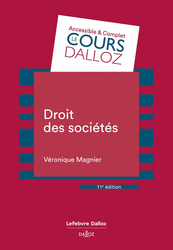
► Référence complète : V. Magnier, Droit des sociétés, Dalloz, coll. "Cours Dalloz-Série Droit privé", 1ière éd., 2002, 11ième éd., 2024, 572 p.
____
► Présentation de l'ouvrage : Cet ouvrage permet d'avoir facilement accès à la compréhension de la matière, il part des règles générales et communes à toutes les sociétés, pour ensuite aller vers les règles spécifiques aux sociétés particulières (SA, SARL, SCI, Société en nom collectif, etc.)
Cette dixième édition traite dans une première partie "le droit commun des sociétés", avec notamment le contrat de société et la personnalité morale de la société, pour ensuite s'intéresser dans une deuxième partie au "droit spécial des sociétés" avec les sociétés de personnes, à responsabilité limitée et de capitaux, pour finir sur le sujet du "groupement des sociétés".
___
► Dans la même perspective du droit des affaires, voir aussi :
🕴️Ch. Neau-Leduc & al.,📕Droit bancaire
🕴️S. Piedelièvre,📕Droit commercial
🕴️G. Beaussonnie,📕Droit pénal des affaires
🕴️S. Piedelièvre,📕Instruments de crédit et de paiement
🕴️F. Gaudu et 🕴️F. Bergeron, 📕Droit du Travail
____
📚consulter l'ensemble de la collection "Cours série - droit privé".
________
Feb. 1, 2024
Teachings
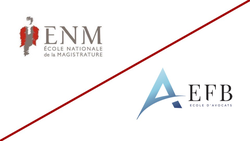
🌐follow Marie-Anne Frison-Roche on LinkedIn
🌐subscribe to the Newsletter MAFR Regulation, Compliance, Law
____
► Full Reference: F. Ancel & M.-A. Frison-Roche, Droit de la compliance (Compliance Law), École nationale de la magistrature - ENM (French National School for the Judiciary), in collaboration with the École de Formation professionnelle des Barreaux du ressort de la cour d'appel de Paris - EFB (Paris Bar School), Paris, February 1 and 2, 2024
This teaching is given in French.
____
____
► Presentation of the Teaching: The aim of this two-day conference is to enable judges and lawyers to grasp the issues, objectives and methods that define Compliance Law as it is practised in companies.
The speakers will illustrate the growing trend towards litigation, which is difficult to reconcile with the supranational dimension, or even indifference to territories, for example when disputes concern systemic climate or digital issues: the result is a renewal of the role of the judge and the role of lawyers.
This must be set against the renewal of the role and operation of companies themselves.
This is analysed from the perspective of Civil Law, in particular Contract Law and Liability Law. Company Law and Criminal Law are also addressed, as well as the way in which the legal system now integrates governance, regulation, climate and digital issues and the smooth operation of financial markets through Compliance techniques.
____
► Organisation of the Teaching: This conference is divided into two parts.
The first day is designed as a presentation of the major themes through which Compliance Law crosses the branches of traditional Law. The speakers will be professors of Law who will successively summarise the branches of Law and put into perspective the way in which Compliance imperatives give rise to new situations, new difficulties and new solutions.
This enables the second day to focus on practical and topical issues and to debate controversial questions between people of different sensibilities. The participants tend to be judges, members of regulatory authorities, lawyers, members of associations and so on.
____
► Enrolment procedure: The course is open to all judicial and consular magistrates, as well as lawyers.
Registrations can be made directly with the ENM or with the EFB.
____
► Speakers :
🎤François Ancel, Judge at the Première Chambre civile de la Cour de cassation (First Civil Chamber of the French Court of cassation)
🎤Thomas Baudesson, Attorney at the Paris Bar, Partner at Clifford Chance
🎤Guillaume Beaussonie, Full Professor at Toulouse 1 Capitole University
🎤Jacques Boulard, Premier Président de la Cour d’appel de Paris (First President of the Paris Court of Appeal)
🎤Marie Caffin-Moi, Full Professor at Paris Panthéon-Assas University
🎤Malik Chapuis, Judge at the Tribunal judiciaire de Paris (Paris First Instance Civil Court)
🎤Lucie Chatelain, Advocacy and Litigation Manager - Civil Liability of Parent Companies, Sherpa
🎤Jean-Benoît Devauges, Directeur Juridique, Ethique et Gouvernance des entreprises (Legal, Ethics and enterprises governance Director), MEDEF
🎤Marie-Anne Frison-Roche, Professor of Regulatory and Compliance Law, Director of the Journal of Regulation & Compliance (JoRC)
🎤Arnaud Gossement, Attorney at the Paris Bar, Partner at Gossement Avocats
🎤Thibault Goujon-Bethan, Full Professor at Jean Moulin Lyon 3 University
🎤Christophe Ingrain, Attorney at the Paris Bar, Partner at Darrois Villey Maillot Brochier
🎤Isabelle Jegouzo, Director of the Agence française anticorruption - AFA (French Anti-Corruption Agency)
🎤Anne-Valérie Le Fur, Full Professor at Versailles Saint-Quentin-en-Yvelines University
🎤Charlotte Michon, Attorney at the Paris Bar, partner at Charlotte Michon Avocat
🎤Jean-Baptiste Racine, Full Professor at Paris Panthéon-Assas University
🎤 Jean-Christophe Roda, Full Professor at Jean-Moulin Lyon 3 University
🎤Jérôme Simon, 1er Vice-Procureur Financier (First Financial Vice-Prosecutor)
____
🧮read below the programme put together and organised by François Ancel and Marie-Anne Frison-Roche, as well as the reports of each presentation⤵️
Jan. 24, 2024
Thesaurus : Doctrine
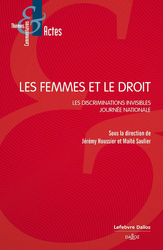
► Référence complète : M. Caffin-Moi, "Les femmes dans les instances de direction des sociétés", in J. Houssier & M. Saulier (dir.), Les femmes et le droit. Les discriminations invisibles, Dalloz, coll. "Thèmes & Commentaires", 2024, pp. 111-122
____
► Résumé de l'article :
____
🦉Cet article est accessible en texte intégral pour les personnes inscrites aux enseignements de la Professeure Marie-Anne Frison-Roche
________
Jan. 17, 2024
Thesaurus : Doctrine

► Référence complète : C. Lanta de Bérard & P. Dufourq, "Défendre les intérêts de la personne physique confrontée à la justice négociée : préserver l’effectivité des droits de la défense et le respect de la présomption d’innocence", in M.-A. Frison-Roche et M. Boissavy (dir.), Compliance et droits de la défense. Enquête interne – CJIP – CRPC, Journal of Regulation & Compliance (JoRC) et Dalloz, coll. "Régulations & Compliance", à paraître.
____
📕consulter une présentation générale de l'ouvrage, Compliance et droits de la défense - Enquête interne, CIIP, CRPC, dans lequel cet article est publié
____
► Résumé de l'article (fait par le Journal of Regulation & Compliance - JoRC) : Pour les auteures de la contribution, les personnes physiques, notamment les mandataires sociaux des personnes morales, sont les "parents pauvres" de la justice négociée, alors même que celle-ci présente de nombreux risques pour celles-ci. Cela tiendrait tout d'abord au fait que la CRPC est inadéquate pour elles, notamment celle-ci n'est pas l'équivalent de la CJIP et qu'elle implique une reconnaissance de responsabilité alors que la CJIP précisément l'exclut, mais que celle-ci vise, comme l'enquête interne qui la précède souvent, des personnes physiques, des faits directement imputables à des mandataires sociaux qui n'ont plus aucune marge lorsque le temps de leur propre procès arrive. Le cas dit Bolloré l'a bien montré. L'enquête interne est ainsi support tout à la fois objet de coopération mais support de l'accusation de la personne physique et l'entreprise peut négocier contre ses collaborateurs, personnes physiques sans que celles-ci ne le sachent même, la présomption d'innocence ne fonctionnant guère dans ce qui est pourtant une enquête pénale déléguée.
Des solutions sont répertoriées par les auteures pour remédier à cette situation défavorable. Il pourrait s'agir d'une réforme législative pour le règlement négocié vise globalement et la personne morale et les personnes physiques impliquées, un encadrement plus ferme de l'enquête interne pour un meilleur respect des principes de la procédure pénale au profit des personnes interrogées et impliquées, un respect plus effectif de la présomption d'innocence lors de l'entrée en négociation dans une CJIP et, empruntant au Droit britannique, l'édiction de l'interdiction d'utiliser devant un juge toute information issue d'une CJIP
____
🦉Cet article est accessible en texte intégral pour les personnes inscrites aux enseignements de la Professeure Marie-Anne Frison-Roche
________
Jan. 4, 2024
Thesaurus : Doctrine
► Référence complète : V. Lasserre, "Les sources textuelles internes et européennes du droit des affaires. L'exemple du devoir de vigilance", JCP E, n° 1, 4 janvier 2024, étude n° 1002, pp. 23-27
____
► Résumé de l'article (fait par l'auteure) : "Comprendre la loi sur le devoir de vigilance est utile. Premièrement, parce que ce devoir est un modèle qui tend à être diffusé. Poursuivant dans le sillon du législateur français, le législateur européen est également en train de construire un cadre européen pour le devoir de vigilance des entreprises. Deuxièmement, parce que de nombreuses actions en justice ont été intentées, montrant la vita- lité de ce devoir. Troisièmement, parce que ce devoir est un moment clé dans le développement de la responsabilité sociale et environnementale des entreprises. On démontrera que des sources hétéroclites ont concouru à forger le devoir de vigilance et que les mots de la loi oscillent entre rupture et continuité.".
____
🦉Cet article est accessible en texte intégral pour les personnes inscrites aux enseignements de la Professeure Marie-Anne Frison-Roche
________
Dec. 19, 2023
Thesaurus : Doctrine
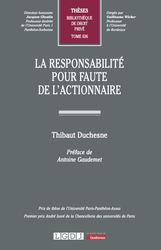
► Référence complète : Th. Duchesne, La responsabilité pour faute de l'actionnaire, préf. A. Gaudemet, LGDJ, coll. "Bibliothèque de droit privé", t. 636, 2023, 900 p.
____
____
📗lire le sommaire de l'ouvrage
____
📗lire la table des matières l'ouvrage
____
► Résumé de l'ouvrage (fait par l'auteur) : "La responsabilité pour faute de l'actionnaire est un concept émergent dont l'étude révèle les mutations contemporaines du droit des sociétés. Le durcissement de la RSE impose de redessiner le statut de l'actionnaire, autrefois considéré comme irresponsable, pour construire une responsabilité pour faute de celui-ci concrétisant les nouvelles aspirations du droit des sociétés. La construction d'une telle responsabilité impose de se départir des objections tirées des règles traditionnelles du droit des sociétés protégeant en apparence l'actionnaire : responsabilité limitée, liberté de vote, écran de la personnalité morale... La pénétration de l'entreprise au cour du droit des sociétés et la réécriture de l'article 1833 du Code civil modèlent un nouveau statut de l'actionnaire fondant sa responsabilité. Outre un statut contractuel centré sur l'intérêt commun des actionnaires, l'actionnaire est désormais doté d'un statut normé par l'intérêt social, lequel vise la préservation de l'entreprise et de ses parties prenantes, dont il faut tirer toutes les conséquences. Cette redéfinition du statut de l'actionnaire doit se déployer sur le droit positif de la responsabilité pour faute de l'actionnaire afin de lui conférer une unité et une cohérence. Par l'entremise du droit commun de la responsabilité civile, la figure de l'actionnaire vigilant et socialement responsable ne pourrait-elle pas ainsi émerger ?".
________
Sept. 28, 2023
Thesaurus : Doctrine
► Référence complète : E. Rapone, "Les assemblées d’actionnaires sous le feu du climat", in F. Barrière et M. Zolomian (dir.), Le droit des sociétés saisi par le climat, JCP E, n° 39, 28 septembre 2023, pp.22-26.
____
► Résumé de l'article (fait par l'auteur) : "Malgré le dialogue actionnarial que le say on climate favorise, l’absence d’encadrement légal et de consensus de place quant à sa validité juridique donne lieu à des divergences d’appréciation entre conseil d’administration et actionnaires. Retour sur cette pratique en développement qui semble s’ancrer de plus en plus en France.".
____
🦉Cet article est accessible en texte intégral pour les personnes inscrites aux enseignements de la Professeure Marie-Anne Frison-Roche
_________
July 24, 2023
Thesaurus : Juridictions étrangères diverses
► Référence complète : High Court of Justice (Haute Cour de Londres), 24 juillet 2023, aff. n° BL-2023-000215, [2023] EWHC 1897 (Ch), ClientHearth c/ Shell PLC
____
____
🏛️lire le jugement du 25 mai 2023 rendu dans la même affaire et que la présente décision confirme
________
June 6, 2023
Newsletter MAFR - Law, Compliance, Regulation
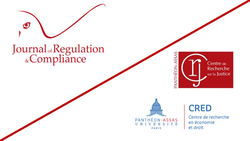
♾️suivre Marie-Anne Frison-Roche sur LinkedIn
♾️s'abonner à la Newsletter MAFR Regulation, Compliance, Law
____
► Référence complète : M.-A. Frison-Roche, "Compliance : obligation, devoir, pouvoir, culture (colloque 13 et 14 juin 2023)", Newsletter MAFR Law, Compliance, Regulation, 6 juin 2023.
____
📧Lire par abonnement gratuit d'autres news de la Newsletter MAFR - Law, Compliance, Regulation
____
🔴 Comprendre l'Obligation de Compliance afin d'en maîtriser la pratique (colloque des 13 et 14 juin 2023 du Journal of Regulation & Compliance (JoRC), du Centre de recherche sur la justice et le règlement des conflits (CRJ) et du Centre de recherche en économie et droit (CRED) de l'Université Paris Panthéon-Assas).
La compliance parait inmaîtrisable dans sa diversité et son ampleur et l'on doute parfois de sa juridicité.
Pour favoriser la maîtrise de cette pratique et construire le Droit de la Compliance, il est essentiel de mieux cerner l'Obligation de compliance.
C'est l'objet de ce colloque.
____
📧lire l'article ⤵️
May 25, 2023
Thesaurus : Juridictions étrangères diverses
► Référence complète : High Court of Justice (Haute Cour de Londres), 25 mai 2023, aff. n° BL-2023-000215, [2023] EWHC 1137 (Ch), ClientHearth c/ Shell PLC
____
____
🏛️lire le jugement du 24 juillet 2023 rendu dans la même affaire
________
May 17, 2023
Thesaurus : Doctrine
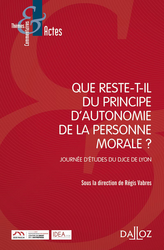
► Référence complète : Th. Favario, "Autonomie de la personnalité morale et devoir de vigilance", in R. Vabres (dir.), Que reste-t-il du principe d'autonomie de la personne morale ? - Journée d'études du DJCE de Lyon, coll. "Thèmes & Commentaires", Dalloz, 2023, pp.103-112.
____
► Résumé de l'article :
____
🦉Cet article est accessible en texte intégral pour les personnes inscrites aux enseignements de la Professeure Marie-Anne Frison-Roche
________
May 17, 2023
Thesaurus : Doctrine

► Référence complète : R. Vabres (dir.), Que reste-t-il du principe d'autonomie de la personne morale ? - Journée d'études du DJCE de Lyon, coll. "Thèmes & Commentaires", Dalloz, 2023, 250 p.
____
____
____
► Résumé de l'ouvrage (fait par l'auteur) : "Principe cardinal du droit des personnes et vecteur de sécurité juridique, l'autonomie de la personne morale est un pilier de notre système juridique. Il est au coeur du droit des obligations dès lors qu'il participe à l'identification du débiteur de l'obligation, du droit patrimonial en ce qu'il favorise de nombreuses opérations de gestion ou de transmission ou encore du droit de l'entreprise.
Ce principe connaît toutefois de profondes remises en cause dans plusieurs branches du droit. Une approche économique, s'extirpant de la réalité juridique, tend en effet à se disséminer dans de nombreuses situations et cela afin de préserver d'autres intérêts et poursuivre des objectifs jugés prioritaires.
L'atténuation de la distinction entre une entreprise individuelle et une société dotée de la personnalité morale, le maintien de la responsabilité pénale en dépit d'une fusion, la mise en oeuvre de la responsabilité d'une société en raison des actes commis par sa filiale sont autant de manifestations invitant à redéfinir l'étendue de l'autonomie de la personne morale.
Cet ouvrage réunit les contributions d'universitaires, en droit des contrats, droit du patrimoine, droit des sociétés, etc. sur des thèmes actuels et faisant écho à des évolutions législatives et jurisprudentielles importantes sur les plans théorique et pratique.".
________

April 12, 2023
Publications

March 24, 2023
Conferences
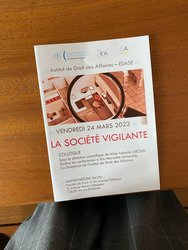
♾️ follow Marie-Anne Frison-Roche on LinkedIn
♾️subscribe Newsletter MAFR Regulation, Compliance, Law
____
► Full Reference: M.-A. Frison-Roche, "Propos introductifs : Les buts monumentaux de la vigilance" (Introductory remarks: The Monumental Goals of Vigilance), in La société vigilante ("The Vigilant Company"), Aix-Marseille University, Institut de Droit des Affaires, March 24, 2023.
____
This conference is done in French; read its English Summary below⤵️
🧮see the complete program of the manifestation (in French)
____
► English Summary of the conference: "Vigilance" is intriguing because, although it occurs in many branches of Law and is familiar in "banking compliance", in a form that is moreover reinforced since it is an obligation of vigilance on the part of the banker about a client whom he/she should "know", it is the "duty of vigilance" that made this notion famous. One could almost say scandalously famous because of a French law of 2017 that now bears its name, called the "Vigilance Law", whereas other laws bear the name of the minister who thought of it, which due diligence (vocabulary used for the European directive) does not erase.
The current challenge is to take the right measure of what "vigilance" is.
Vigilance goes beyond the French Loi Vigilance, which is not enough to express what it is in its few dispositions. To say what it is in the legal system, to use it in practice, to propose the intellectuel legal exercice of qualification, Vigilance must be thought of in Compliance Law, of which it is both a "Tool" and the most advanced point, as shown by the European Directive, whose discussions during its elaboration show these design issues.
Thus, like the whole of Compliance Law, Vigilance is understood, deployed, analysed and exercised through what underpins and gives meaning to all these constantly changing regulations, powers, and obligations, through Compliance Monumental Goals which give it stability and simplicity. This is the least that can be done in a mechanism that has the ambition to organise the "sustainability" of economic relations.
But while Vigilance expresses and concretizes Compliance Monumental Goals, it must not go beyond measure.
In fact, to set up structures, use tools and behave in such a way that human rights and nature are effectively and extraterritorially protected, both negatively and positively, these obligations of the company, which is the natural subject of the "duty", more generally the natural subject of Compliance Law, see its legal powers increased, these means being required for the company to fulfil its new obligations, first legal, then contractual, soon to be unilaterally formulated.
Perhaps we should conceive of a "vigilant company" and not just a company that, beyond and through its economic activity, cares for others and the world, but a company that "watches over" everything and on everything would be to go beyond the measure, to make companies the "regents" of the world and the people who live in it.
Faced with this perspective to be excluded, the construction of a Europe of Compliance, which does not be reduced to corruption fighting or environment protection, and draws on its humanist tradition, distinguishing itself in this respect from the American and Chinese compliance systems, is the major challenge.
Companies are not the alpha and omega, but they are one of the elements of an Alliance between the political Authorities and the population, its link, the one that allows us to escape from the limit of the territory, in what we call by this inadequate term of "extraterritoriality". It is rather a question of going beyond territories, required by the Compliance Monumental Goals of Compliance, of which Vigilance is the advanced point.
____
🚧read the English Working Paper, basis of this conference: "Vigilance, Compliance Monumental Goals, and "Vigilant Company""
____
📈see the slides created for this conference (in French)
____
📝read the article published after this conference
________
Oct. 12, 2022
Conferences

♾️ follow Marie-Anne Frison-Roche on LinkedIn
♾️subscribe to the Newsletter MAFR Regulation, Compliance, Law
____
 ► Full Reference: Frison-Roche, M.A., La compliance en entreprise : aspects théoriques et pratiques, in 118ième Congrès des Notaires, L'ingénierie notariale, Marseilles, October 12, 2022.
► Full Reference: Frison-Roche, M.A., La compliance en entreprise : aspects théoriques et pratiques, in 118ième Congrès des Notaires, L'ingénierie notariale, Marseilles, October 12, 2022.
This Masterclass is given in French.
____
► English Presentation of this Masterclass: This two-hour Masterclass aims to introduce, regarding the role of the Notary in companies and vis-à-vis them, Compliance Law.
This discover of Compliance Law is built on a description of the new Compliance techniques of which companies are the object or the source (I) then, faced with such a mass of new standards, because this is incomprehensible and uncontrollable if these so many regulations are not "conceived", explain what can give meaning to this Compliance Law, namely the "Monumental Goals" which animate it and give it meaning (II). Like the Regulation Law that Compliance prolongs, Compliance Law is a teleological branch of law that requires that the application and interpretation of norms be done by these Monumental Goals.
____
This Masterclass is given in French: see some technical references in English ⤵️